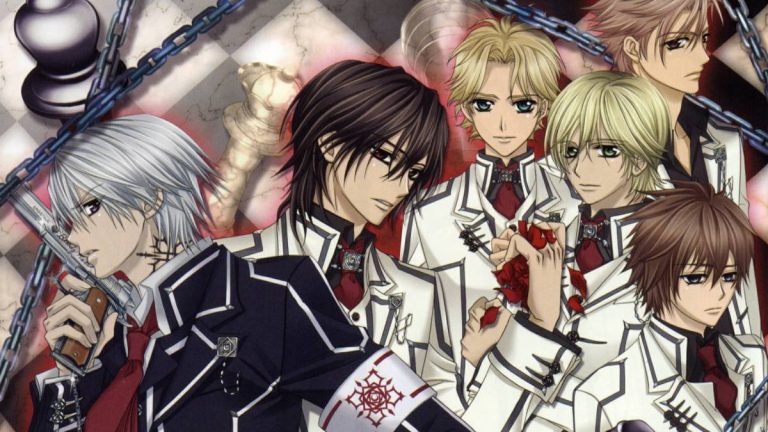Anime is definitely enjoying a bit of a moment thanks to the major success of Attack on Titan. Now even anime virgins can simply switch on Netflix and enjoy. Anime has become a lot more accessible from even when I started out watching it.
For those that don’t know about different anime genres, a lot of the shows that achieve major success would be classed as shonen, anime that is largely created for boys and featuring heavy action sequences in the storytelling. These include action shows like Bleach, Death Note, Naruto
, and most recently Attack on Titan, but girls would avidly watch these shows too. I loved them and others but these were ‘cool’ animes – it was okay to watch these shows. But there’s a type of anime that always seems to be relegated to ‘only being for silly lovestruck teen girls’ and that’s shōjo.
Shōjo animes and mangas are created for girls usually containing plucky female leads surrounded by a harem of breathtakingly beautiful long-limbed, violet-eyed boys with dishevelled and impossible hairstyles all irrevocably in love with said female lead. But that’s only what shōjo looks like from the outside. Shōjo is looked upon with almost a little shame, as if you only watch it as a guilty pleasure if you’re over 15 years old, and if you’re over 15 or a guy, it’s better if you don’t admit to watching at all. But why?
Why should shonen get all the success even in this day and age while anime ‘for girls’ seems to be relegated to being silly and superficial. It’s wrong. Sometimes I’ve found myself watching a shōjo series and realising it has the best characterisation of any show I’ve watched, but have been too afraid to admit to it for fear of being mocked. What exactly is it that’s so shameful about shōjo? I know guys that secretly love nothing more than watching a classic Tom Hanks/Meg Ryan romcom so why should shōjo be any different?
Shonen is for everyone and shōjo should be for everyone too, not just teen girls. My shōjo obsession started around the time the world was going crazy for vampires with the much loved/hated Twilight franchise. In my teens I enjoyed Twilight, but there was another vampire series that I devoured page-by-page that overshadowed it by far: Vampire Knight.
Sure, it contained all the usual shōjo tropes: an annoyingly spunky cheerful female lead, a high school setting and lots of very beautiful vampire boys but Vampire Knight was different. It contained all of that but it also contained action, horror and violence. The pages were splattered in inky blood and crazed demented bloodthirsty vampire villains. These vampires didn’t sparkle, they killed.
Vampire hunters hunted said crazed vampires with vampire weapons and Zero, the main male lead, had the coolest gun and ear piercings and I just thought he was the coolest most bad ass guy in the world. Why weren’t boys reading this too? Oh wait because the main character was a girl who happened to have two guys that were in love with her that’s why. But there was nothing slushy about the romance elements at all.
The storyline became increasingly dark and creepy as the volumes went on and the romance elements were always handled carefully and these characters were well drawn and all had emotional and psychological baggage. There were major plot elements that had literally nothing to do with the romance elements at all. I revisited the series recently and found it just as captivating. Shōjo isn’t for teen girls, it’s for everyone if people would only set their preconceptions aside.
Another example of shōjo anime that turns the stereotypical shōjo standards on its head is Ouran High School Host Club. It’s set in a school and has a male harem; I know what you’re thinking, but what makes this series different is that it has its tongue firmly in its cheek. Ouran High School Host Club is a club where eligible attractive males entertain female students with their general charm as each having their own particular ‘act’ they put on. For example, there is a strong silent type, the mischievous twins etc. etc. Here it’s the ridiculous stereotypical male shōjo attributes that are being mocked. It’s a very clever and funny show with a refreshingly strong female lead.
All of these guys find a match in Haruhi: a smart female student who they initially mistake for a boy and end up employing in the host club. Haruhi is genuinely smart and all of the characters are interestingly unique whilst remaining true to the genre. In reality they are nothing like the parts they play. They all have their own secret insecurities. Haruhi proves to be a very popular host just being herself much to the other characters distress. As the series continues and Haruhi’s identity is revealed the characters attitudes towards her do not change, yes some pursue her romantically, but mostly they have a genuine respect and love for her that speaks of true friendship.
There are genuine heartfelt scenes in this series where Haruhi experiences moments of vulnerability and the guys you expected to show the least concern turn out to be surprisingly sensitive and tender. It’s a comedy and good fun but OHSHC has its serious moments too that are always expertly handled. It will always remain of my favourite animes. Not shōjo anime, just anime in general.
Go on, try one out. Sure, there are shōjo animes out there that are frothy and over the top with romance, but only if you want to find them. Shōjo should be and can be for everyone too, if only people would give it the chance. I hope I’ve convinced you to try one out. Shōjo should be celebrated, not kept as a guilty pleasure.
Some of the coverage you find on Cultured Vultures contains affiliate links, which provide us with small commissions based on purchases made from visiting our site.

